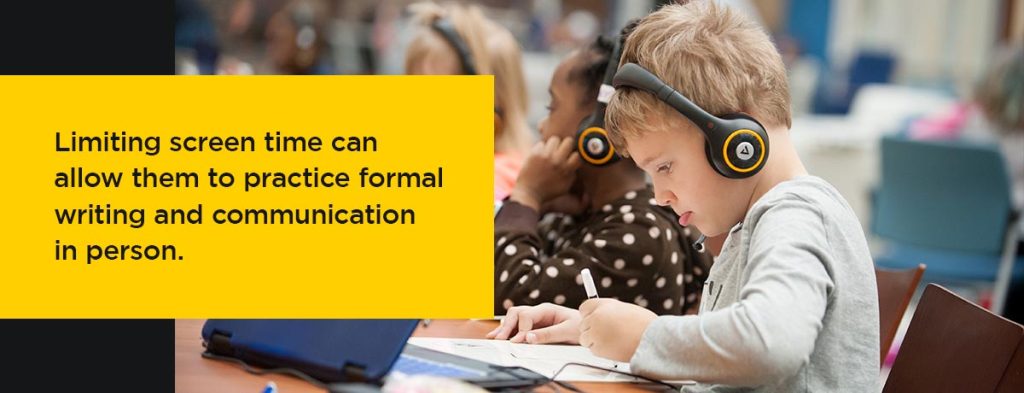Enrollment Now Open for Second Semester. Click Here
Enrollment Now Open for Second Semester. Click Here

As the newest phones, tablets, and laptops make their way to stores across the globe, there’s no doubt that most children have at least one device with them at all times. While keeping connected with the rest of the world is integral to learning about current events, socializing with family and friends, and networking online, texting on a cellular device can impact children’s language skills.
Consider how these communication changes are essential as your child enters elementary, middle, or high school.
Many parents hesitate to buy their children electronics at such a young age due to the impact of the digital age on developing minds. Most middle and high school students have their own phones to keep in contact with friends and family, so your child may ask you for a device too. Before you give a definite answer to their proposition, consider if the language difference online might affect their ability to communicate effectively in person.
So, does texting affect writing and grammar? Luckily, studies have shown that children can distinguish between formal writing and short message service (SMS) texting. English teachers have demonstrated that their students’ abilities to read and write do not have a significant correlation with texting. However, educators encourage texting with friends and family to gain more experience writing and communicating with others.
However, in the teachers’ opinion, texting does not improve or diminish students’ writing ability. Most participants in the study stated that they fear thatover-texting might negatively impact writing and language due to the constant changes in trending cyber slang. Therefore, you can choose how to encourage your child to spend time texting with others, so they do not become dependent on SMS language.
Communicating with friends and family online or through text allows your child to connect with the outside world. Their ability to remain in contact with individuals in different towns, states, and even countries provides numerous benefits.
The positives of texting include:
Technology has become a staple in many younger generations’ everyday lives. The easy access to communication with friends and family allows them to socialize regularly.
So, why do parents constantly ask themselves why texting is bad for communication? The effects of texting on language start when your child picks up on slang and other changes to the conversation. Texting, while convenient, can influence your child’s writing, spelling, and language skills.
The negative side effects of over texting include:

Maintaining a healthy balance of online activity and proper language usage can seem tricky with the digital age children grow up in today. Phones, laptops, and tablets are standard in schools and at home with students worldwide. So, how can you limit the effect of texting on writing skills?
One of the most important factors to remember as your child picks up their phone to text is that children are becoming more familiar with the differences between SMS texting and formal writing. Their use of slang when communicating with others is prevalent in their minds as they type out their messages to friends.
However, as they grow older, they may notice a decrease in their capability to write formally to colleagues or professors due to the popularity of texting. Studies have shown that high school and college students who text more excel at informal writing than formal writing.
To avoid this concern for your child’s future, you can create situations where texting and formal communication are equal in your child’s life. Since SMS texting is only effective for short and simple communication, encourage your child to balance their writing skills by typing or handwriting their assignments.
Limiting screen time can allow them to practice formal writing and communication in person. Managing your child’s devices keeps them safe online, so they can continue to further their education in a growing digital world.
With an online education at CCA, your child can develop their passion for writing, language, and effective communication skills. Enjoy the flexibility of online learning with personalized learning schedules to fit your family’s busy schedules.
When you enroll your child at CCA, their academic growth and development as a citizen of their community become our top priority. With K-12 online learning programs, they can enjoy exciting educational opportunities from the comfort of their home while broadening their horizons to higher education, extracurricular activities, and making a difference in the world around them.
Contact us today to learn more about how CCA can fit your and your child’s needs for quality education.
Enrollment Now Open for Second Semester. Click Here